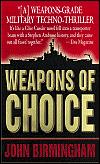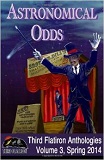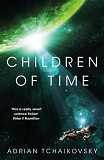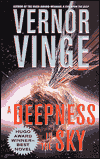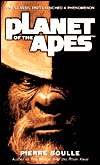
Planet of the Apes, by Pierre Boulle
Book Review by Pete S. Allen
Have you read this book?
Recently my wife and I were discussing her (relatively) recent burgeoning interest in science fiction. One reason she says that she finds the genre so interesting is that science fiction (in the traditional definition, i.e. as opposed to fantasy) seems overall to be very concerned with the question of what it is to be human. Coincidentally, on my last trip to the library, I picked up this book, which very much seeks to address this question, or at least to explore it, if not to answer it.
Planet of the Apes was written by Pierre Boulle, a French author perhaps better known for his Bridge on the River Kwai. He seemed to have a knack for selling books to Hollywood. But apart from the title and the names of the apes, there is very little similarity between book and movie in this case (sorry to disappoint the Charleton Heston fans in the crowd) apart from a rough story outline and the names of your ape heroes. The book takes place in the far future when we join a young couple that is tooling around in space for kicks, in a yacht-type ship that uses a solar sail for propulsion. To carry that vacationing-on-the-ocean image a bit further, they find a bottle. Yes, with a message in it. What are the odds?
So here we should bring up a bit about the suspension of disbelief -- obviously a necessity in all forms of fantastic literature, suspension of disbelief is the point to which something is so ludicrous that you lose interest because of its unbelievability vs. being able to willingly accept something fantastic for the sake of the story. I am happy to report that finding a bottle in space by chance is about the hardest thing to believe in this book, though that's not saying much if you know anything about odds...
So our young couple finds the message, which is a journal of space travellers and their adventures on the Planet of the Apes -- I'm not actually giving anything away apart from the first few pages, really. The journal takes up then, the bulk of the novel. At this point, the story follows loosely the same sequence of events that those familiar with the film will know -- is there anyone unfamiliar with the film at this point? Either one will do, really. Heck, even if you've only seen the Simpsons musical version you'll be ok.
The writer of the journal is a French journalist from 26th century Earth, one Ulysse Merou. Ulysse relates how he is asked to join an expedition into space, along with a scientist and his young protege to explore the Betelgeuse system. The journey will be made at close to light speed and will take several years, which will relatively cost the travellers six or eight hundred years earth-time. Ulysse is, like the others, without family, so the adventure seems worthwhile.
Once they arrive at their destination, they discover a planet that is very similar to Earth in its atmosphere, temperature, etc. And so we have come upon that whole suspension of disbelief thing again. Our heroes land, and find a bizarro world where apes are civilized, humans are savages and witless, etc. They make some interesting discoveries, about the worlds and about themselves -- I will leave it to the reader to use their imagination or better yet, read the book at this point. There's not much more I can say about the story without ruining some nifty surprises. Like I said, anyone vaguely familiar with pop culture of the last 30 years will have a pretty good idea of the hijinx about to occur.
So. Let's talk about the book itself. Planet of the Apes is a pretty nifty adventure story, and leans into that shadowy realm of dystopia and moral play. I've already given enough hints that it's not hard s-f, and Boulle takes it into an almost fairytale-type style. It is whimsically written, and there are some very interesting observations on humans frailties and foibles. It's not heavy-handed, as many dystopian novels are (and many more are dangerously close), but rather nearer to the other end of the spectrum, bordering on being almost fluff at some points. There are some great humorous moments where Ulysse has to choose between maintaining his human dignity and following his baser instincts, and usually goes with his organs.
It's hard to know what Boulle intended to say though -- most dystopian novels have a very definite Message. There are certainly many smaller messages here (be nice to animals, don't experiment on them, you never know when the tables will be turned) and it may be that he just wanted to write a fun adventure story. Like I said, it's very whimsical. He obviously intended to overstep, or at least dance with that suspension of disbelief thing, and isn't too concerned with when fantasy science mixes with real science (his real science is pretty good though). After mulling all of this over for a few days, I decided not to worry too much about all that, (since the author obviously didn't) and just let myself enjoy the book, which I did very much.
I enjoyed Ulysse as a main character far more than Heston, or even Marky Mark. I enjoyed the circumstances, the imprisonment and the eventual outcome (and relationships) far more than I did in the movies -- there is as much tension, but it's not as overtly violent, in case you were wondering. And I even enjoyed the ending far more -- it made more sense than either of the movies, and had not one, but two, count them two surprise twists. Fun, hey?
Finally and sadly, (and this is a bit of a spoiler), in the book no one ever says, "Get your hands off me, you dirty filthy apes," or even a close approximation.
Planet of the Apes was written by Pierre Boulle, a French author perhaps better known for his Bridge on the River Kwai. He seemed to have a knack for selling books to Hollywood. But apart from the title and the names of the apes, there is very little similarity between book and movie in this case (sorry to disappoint the Charleton Heston fans in the crowd) apart from a rough story outline and the names of your ape heroes. The book takes place in the far future when we join a young couple that is tooling around in space for kicks, in a yacht-type ship that uses a solar sail for propulsion. To carry that vacationing-on-the-ocean image a bit further, they find a bottle. Yes, with a message in it. What are the odds?
So here we should bring up a bit about the suspension of disbelief -- obviously a necessity in all forms of fantastic literature, suspension of disbelief is the point to which something is so ludicrous that you lose interest because of its unbelievability vs. being able to willingly accept something fantastic for the sake of the story. I am happy to report that finding a bottle in space by chance is about the hardest thing to believe in this book, though that's not saying much if you know anything about odds...
So our young couple finds the message, which is a journal of space travellers and their adventures on the Planet of the Apes -- I'm not actually giving anything away apart from the first few pages, really. The journal takes up then, the bulk of the novel. At this point, the story follows loosely the same sequence of events that those familiar with the film will know -- is there anyone unfamiliar with the film at this point? Either one will do, really. Heck, even if you've only seen the Simpsons musical version you'll be ok.
The writer of the journal is a French journalist from 26th century Earth, one Ulysse Merou. Ulysse relates how he is asked to join an expedition into space, along with a scientist and his young protege to explore the Betelgeuse system. The journey will be made at close to light speed and will take several years, which will relatively cost the travellers six or eight hundred years earth-time. Ulysse is, like the others, without family, so the adventure seems worthwhile.
Once they arrive at their destination, they discover a planet that is very similar to Earth in its atmosphere, temperature, etc. And so we have come upon that whole suspension of disbelief thing again. Our heroes land, and find a bizarro world where apes are civilized, humans are savages and witless, etc. They make some interesting discoveries, about the worlds and about themselves -- I will leave it to the reader to use their imagination or better yet, read the book at this point. There's not much more I can say about the story without ruining some nifty surprises. Like I said, anyone vaguely familiar with pop culture of the last 30 years will have a pretty good idea of the hijinx about to occur.
So. Let's talk about the book itself. Planet of the Apes is a pretty nifty adventure story, and leans into that shadowy realm of dystopia and moral play. I've already given enough hints that it's not hard s-f, and Boulle takes it into an almost fairytale-type style. It is whimsically written, and there are some very interesting observations on humans frailties and foibles. It's not heavy-handed, as many dystopian novels are (and many more are dangerously close), but rather nearer to the other end of the spectrum, bordering on being almost fluff at some points. There are some great humorous moments where Ulysse has to choose between maintaining his human dignity and following his baser instincts, and usually goes with his organs.
It's hard to know what Boulle intended to say though -- most dystopian novels have a very definite Message. There are certainly many smaller messages here (be nice to animals, don't experiment on them, you never know when the tables will be turned) and it may be that he just wanted to write a fun adventure story. Like I said, it's very whimsical. He obviously intended to overstep, or at least dance with that suspension of disbelief thing, and isn't too concerned with when fantasy science mixes with real science (his real science is pretty good though). After mulling all of this over for a few days, I decided not to worry too much about all that, (since the author obviously didn't) and just let myself enjoy the book, which I did very much.
I enjoyed Ulysse as a main character far more than Heston, or even Marky Mark. I enjoyed the circumstances, the imprisonment and the eventual outcome (and relationships) far more than I did in the movies -- there is as much tension, but it's not as overtly violent, in case you were wondering. And I even enjoyed the ending far more -- it made more sense than either of the movies, and had not one, but two, count them two surprise twists. Fun, hey?
Finally and sadly, (and this is a bit of a spoiler), in the book no one ever says, "Get your hands off me, you dirty filthy apes," or even a close approximation.
|
Click here to buy Planet of the Apes, by Pierre Boulle on Amazon
|
Planet of the Apes, by Pierre Boulle on Amazon

| More Books You Might Like |
Comment on Planet of the Apes, by Pierre Boulle
| Comments on Planet of the Apes, by Pierre Boulle |
| Posted by Kent on 10/31/2008 |
| that book was absolutely amazing the only down turn was the humans were underdressed |
